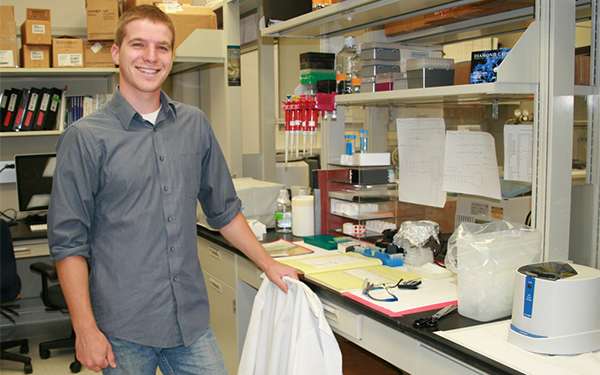Chemistry student studies cold tolerance of algae in the search for renewable energy

Could a solution to harness renewable energy ultimately rest with gooey seaweed? One Ohio University student spent a research internship at a national laboratory last year helping to find the answer.
Micro algae are small, single cell organisms that grow quickly and take carbon dioxide out of the atmosphere to make biomass. These algae can be processed to make fuel, potentially serving as a great homegrown source of renewable, sustainable fuel for our nation's transportation fleet, according to the U.S. Department of Energy.
However, green algae are difficult to cultivate during cold winter months, which keeps the organism from being a cost-effective choice.
To help solve this problem, Jacob Sieg, an Ohio University undergraduate chemistry major, worked in a national lab to learn more about the challenges scientists must overcome. He was awarded a paid internship for fall 2014 from the Department of Energy's Science Undergraduate Laboratory Internship Program at the Marine Sciences Laboratory, headquartered at the Pacific Northwest National Laboratory's Sequim Marine Research Operations located on Washington State's Olympic Peninsula.
Sieg studied plant genetics and explored the effect of known plant hormones on algae photosynthesis and biomass production after cold exposure. The goal of his research was to help identify algae hormones and genes that can help mitigate the devastating effects of a winter cold snap on the algae.
The internship was an opportunity to hone a number of skills that included planning experiments, conducting literature searches, improving his writing skills and working with supervisors, Sieg said.
"The best thing about working at a national marine sciences lab is to work in a state-of-the-art facility with researchers who are working towards solving a number of problems—everything from algae biofuel development, to extracting uranium in sea water, to monitoring the health of marine life in areas important to human development," Sieg said.
Provided by Ohio University




















